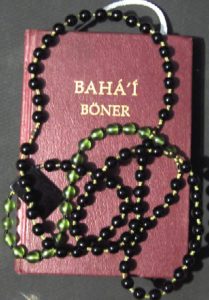
Baha’i
The Bah’ai Faith grew out of Shi’ite Islam and the belief in a 12th Imam – a successor of Mohammed – who would renew religion and guide the faithful. In 1844 Mirza Ali Mohammed proclaimed an imminent appearance “of a new messenger of God who would overturn old beliefs and customs and usher in a new era.”13 He himself declared that he was the forerunner of this coming prophet and took upon himself the title “Bab” (Persian for “Gateway”). The Bab’s teachings spread quickly but ultimately led to his imprisonment and execution as well as the persecution and death of about 20,000 of his followers in Iran. Mirza Hoseyn Ali Nuri was an early ardent follower of the Bab and took on the name of Baha’u’llah (Persian for “Glory of God”). He was arrested in 1852 and jailed in Tehran where he came to realize that he was in fact the prophet that the Bab had spoken about in his teachings. He was released in 1852 and exiled to Baghdad where he assumed leadership over the Bah’ai community. In 1863 he was relocated to Constantinople where he declared to his fellow believers that he was the prophet foretold by the Bab. He was accepted by the overwhelming majority of the followers and declared the prophet. Before his death in 1892, he appointed his eldest son Abd ol-Baha to be the leader of the Bah’ai Faith and authorized interpreter of his teachings. The Bah’ai Faith spread rapidly through North America and Europe as well as other points around the globe.13
The followers of the Bah’ai Faith believe in only One God, the creator of the universe. God has absolute control over His creation and has complete knowledge of His creation. Bah’ai emphasizes the fact that God is entirely self-sufficient and is above and separate from His creation. God is not in need of worship “so the obedience he asks of humankind is entirely for the benefit of individuals and motivated only by his love for them.”14 Bah’ai teaches that even though mankind has different concepts of God’s nature and call Him by various names we are all speaking about the same unique Creator. God is ultimately unknowable but to help assist mankind in understanding Him He has sent messengers to humanity.14
The holy text of the Bah’ai Faith is the Kitab-i-aqdas which is a book of laws written by Baha’u’llah. It is comprised of 100 volumes which cover a wide range of topics “including laws and principles for personal conduct and the governance of society, as well as mystical writings dealing with the progress of the soul and its journey towards God.”15 Bah’ai also recognize the Bible, Qur’an, and revealed holy texts of other religions.15
The Bah’ai Faith does not teach that there exists a “Satan” or a “Devil” or an “Evil Force.” Bah’ai teaches that evil does not have an independent existence but is really defined as the absence of good. The teachings of Bah’ai reject the concept of “original sin” or any other doctrine that teaches that people are at their base evil or have evil elements within their nature. According to Bah’ai teachings pride is one of the greatest hindrances to spiritual progress. Accordingly it is only revealed religion that can save mankind from their imperfections because God has “sent his Manifestations to show us the path to spiritual development and to touch our hearts with the spirit of God’s love. … Salvation means drawing nearer to God and progressing on the path to a deep and satisfying happiness.”17
—————
15“Do the Bah’ai’s have a holy book?” bahai.org. Bah’ai International Community, 2013. [http://www.bahai.org/faq/beliefs/writings]
16“Bah’ai beliefs about sin, Satan, and evil.” religionfacts.com. Religion Facts, n.d. [http://www.religionfacts.com/bahai/beliefs/evil.htm]
17“Bah’ai beliefs about sin, and salvation.” religionfacts.com. Religion Facts, n.d. [http://www.religionfacts.com/bahai/beliefs/salvation.htm]
